Exploring Hitchcock’s Horror in “Hitchcock/Truffaut” (2015) and Ryan Murphy’s “Grotesquerie” (2024)
Something about the male gaze, bad things happening to vulnerable people, and the art of deception feels eerily like a pre-Election foreshadowing.
Sin is Sinful, but so Riveting to Watch - “Grotesquerie,” Mainly
"I would get drunk with them, take one back to my cabin and if I got a tip I told myself it was for dancing and not all the other stuff. I ended up on the streets. I had ways to go [before my rock bottom],” he recalled. “Long story short, I was just missing my dignity. I had to find stuff to live for. You haven't lost your dignity. So don't.” - Ed Lachlan (Travis Kelce), Grotesquerie, proselytizing in a bid to get Marshall (Courtney B. Vance) to join his “fight club” type club
François Truffaut, filmmaker and founder of French New Wave film, film critic, and lifelong fan of Hitchcock, once said of Hitchcock’s signature style (Hitchcock/Truffaut), “In your films, I always get the powerful scent of original sin.”
The same could be said of showrunner Ryan Murphy’s mode of interest (Monster: The Jeffrey Dahmer Story, American Horror Story, American Crime Story, The Watcher, Nip/Tuck). Murphy has an affinity for going deep into the dirty, depraved, and dark recesses of his characters’ minds and having them perform at times, outrageous, and sometimes provocative acts, and yielding tangible results in the form of multiple hit shows that audiences either love or hate. Whether he’s basing his stories off of real life (Feud series or the Dahmer one, as an example) or going completely fiction, like in his latest fore into horror that hits every fear decibel, Grotesquerie, currently airing on Hulu, he’s effective at using horror as a means to provoke and stimulate incisive, topical social commentary.
Grotesquerie is a show that is essentially about waking up from a nightmare, but not being quite certain you’ve woken up. It’s kinda like “The Upside Down” from Stranger Things only minus the cool 80s soundtrack and confidence that life is better on the other side, in the real world. Spoiler: It’s not better. The menacing horror from the nightmares/coma seeps into the real world in parallel universe fashion. Sound familiar?
The formidable Niecy Nash (Claws, Reno 911, Dahmer) and Murphy’s muse du jour stars as Lois, a smart, tells-it-like-it-is detective who also happens to be a recovering alcoholic and unreliable narrator. In what appears to be her final case as she needs to retire, she’s up against a serial murderer pulling off a string of very complicated and intricate murders + murder scenes (one of them replicates “The Last Supper”) and that part has you scratching your head, like, a) One person did ALL that? And b) That had to take a LONG time to execute (not literally). How were they not caught in the act, quite literally? I consider myself lucky in that my brain gets so focused on these details that my eyes often overlook the “grotesqueness” of what’s in front of me.
The show spins up a web of thoughts pertinent to our current political climate. In exploring how people indulge in unhealthy acts with a vice (food, alcohol, sex, and even religion) it also gets at the root of all that - fragility of mental health and how we treat one another. Nash and Diamond, in her first screen role, is also superb as a nun, and together, they dominate the scenes in the first half of the series. I found it interesting that for such a female lens-type show, the finale flipped its gaze to focus on a very unlikeable character, Marshall, Lois’s husband, and even Ed (Kelce), his son-in-law, and gave us the male perspective in the form of a #MeToo reckoning, 25 years post-Fight Club. For me, it begged the question, “How relevant will this lack of being heard, from a male lens, be a factor in the deciding vote in swing states next week?”
And now…The Alfred Hitchcock Hour
it’s a well-known fact that Alfred Hitchcock wasn’t too kind to his stars (Quote Exhibit A: “Actors should be treated like cattle.”) and a bonafide lech when it came to his infatuation with The Birds and Marnie actress Tippi Hedren. This is also well documented through Hedren’s first-person account. In watching many of his films in my youth and revisiting them as an adult recently, I wanted to see if I could shake the horrible things happening to women vibe in his films, that I’d always left his work, feeling half queasy over.
In Hitchcock’s world, women are either cunning femme fatales (Janet Leigh in Psycho, Kim Novak in Vertigo) or hapless and somewhat hopeless (Hedren in Marnie and even The Birds). Surprisingly, it’s an earlier film of Hitchcock’s in which we see more depth and development in his understanding of the female psyche - and that is through the character of Charlie (Teresa Wright) in Shadow of a Doubt, (1943) said to be Hitch’s favorite of his films, but oddly disputed by him in the Truffaut interview.
Charlie is a clever high school student, who is beguiling, studious, and disillusioned with the world. It bears mentioning that she’s also a brunette, a calculated choice, given Hitchcock’s female film leads are generally blondes. Charlie is the dominant figure in her family, often taking on the “head of household” role and making the most logical sense of things. She has a keen sense of detail and observes her environment purposefully. This doesn’t go unnoticed by her psychotic uncle, “The Merry Widow Murderer” and it’s no surprise then that she is also the one that learns of her uncle Charlie’s deception (her namesake) played by The Third Man’s Joseph Cotten.
Uncle Charlie (bad guy) manipulates hero Charlie (good gal) into remaining silent about his crimes, not because she’s weak (another important distinction), but rather the opposite - she has a strong sense of integrity and dedication to her family. She knows his crimes will hurt her mother and her family’s reputation in their town, of Santa Rosa. Pride of home and safeguarding the town and its community are big themes here. Coincidentally, one of the film’s screenwriters is Thornton Wilder, a playwright who wrote, “Our Town.” If you don’t know this play, look it up and go see it!
Oh, earth, you're too wonderful for anybody to realize you. Do any human beings ever realize life while they live it -- every, every minute?
Hitchcock/Truffaut (2015) now available on Kanopy, is a documentary profiling the 1966 interview between the filmmakers Hitchcock and Truffaut in which the two discuss the art of filmmaking, in a very technical and philosophical way. The interesting and educational dialogue forms the basis for Truffaut’s famed book of the same name. When I first turned on the film, I had wrongly thought it would be the original interview. It’s not. I was somewhat disappointed. Instead, it’s really about how Hitchcock and Truffaut’s films affected certain well-known directors of our time, David Fincher, Martin Scorsese, Wes Anderson, and Richard Linklater, among them, and a slew of non-American male directors. It’s worth mentioning that there are zero women directors of film production professionals, at all interviewed. I found this lack of perspective troubling and limiting.
In another sense, I enjoyed learning about Truffaut. I knew much more about Hitchcock, and while my former UMich French professor, David Caron, would likely be unhappy with me for forgetting about the iconic French cinematic classic of the New Wave, Les Quatre Cents Coups (400 Blows), especially after all the film classes I took with him, I can now quote lines from the film. Not really though, but I will always be a Mathieu Kassovitz fan and remember fondly the films of Claire Denis’ from the 90s.
Some interesting things I learned in watching Hitchcock/Truffaut:
Hitchcock was trained as an engineer. He got into advertising and from there made silent films before he eventually went into “talkies”
Hitchcock’s style was formed through making silent films. Fincher pointed out that the art of making motion pictures for Hitchcock was about the behaviors and details - that you could likely watch an entire Hitchcock film muted, without any sound. That’s the way he intended it.
Case in point: In a signature scene in Truffaut’s 400 Blows, the main character, a boy is skipping school with his friend and walking in the middle of the day in a busy intersection, when he witnesses his mom locked in a passionate embrace with a man who isn’t his father. Both mother and child see one another and are silenced by their complicity. The boy proceeds to tell his friend and they talk about it. Hitchcock’s note for Truffaut: Why did you have them talk? They didn’t need it. It should have remained silent.
Hitchcock made two versions of The Man Who Knew Too Much, a spy thriller. Most of us are familiar with the 50s version with Doris Day and Jimmy Stewart, but the original is from 1934 and stars Leslie Banks, Peter Lorre, and Edna Best. On the subject of the remake, Hitch had this to say, "Let's say the first version is the work of a talented amateur and the second was made by a professional."
Some Other Stuff I’m Watching (SOME Spoilers - But mostly in the form of Beth solving cases)
The Law According to Lidia Poet on Netflix (Status: Finished S2) - Va Bene! Certo! Those are the three words I know now in Italian and all thanks to this show - an Italian period drama featuring beautiful people wearing gorgeous costumes, a modern woman with feminist sensibilities (loosely based on real-life first female lawyer in Italy, Lidia Poet) sporting corsets, and a solved murder mystery in each episode - Sign me up, please. I just finished the whole second series.
Disclaimer on Apple TV+- (Status: Still watching) I think I solved the whole mystery of Catherine’s backstory with Jonathan. I’m pretty sure he assaulted her in the past. Catherine, in the present day, comments on one of last week’s episode drops, “I wanted him to die,” and ‘We didn’t have an affair,” about Jonathan to Sasha Baron-Cohen, her husband on the show.
is also watching this show.The Diplomat on Netflix(Status: Haven’t started S2) I know that there are some Keri Russell fans in the Substackiverse. I think mostly male, but I’m here for Russell too. There’s a review of the show from a diplomat’s perspective that I found on LinkedIn. 🔗 Foreign Secretary James Cleverly fact-checks The Diplomat
Hitchcock-related film Stuff from The Substack Universe
Reviews of the recent-ish film, My Name is Alfred Hitchcock, which served as my inspiration for getting deeper into Hitch, at the moment. This film should not be confused with the one I reviewed here.
Let’s Discuss
Anything - What’s on your mind?
Do you promise to watch Grotesquerie so we can talk about it? Yes and thank you.
Can Lesley Manville do any wrong? She’s such a tour de force and her turn as Nurse Redd in Grotesquerie had me doing a 180. I wanted to see her in every scene.
Favorite Hitchcock film?
Any recent Substack readings from other authors that have inspired you to take diversions and explore more in your posts?




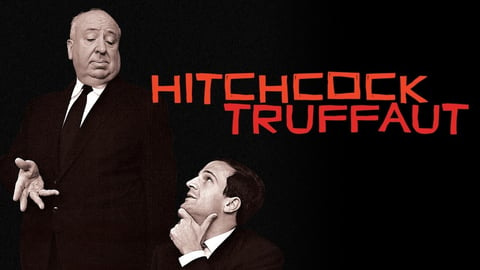
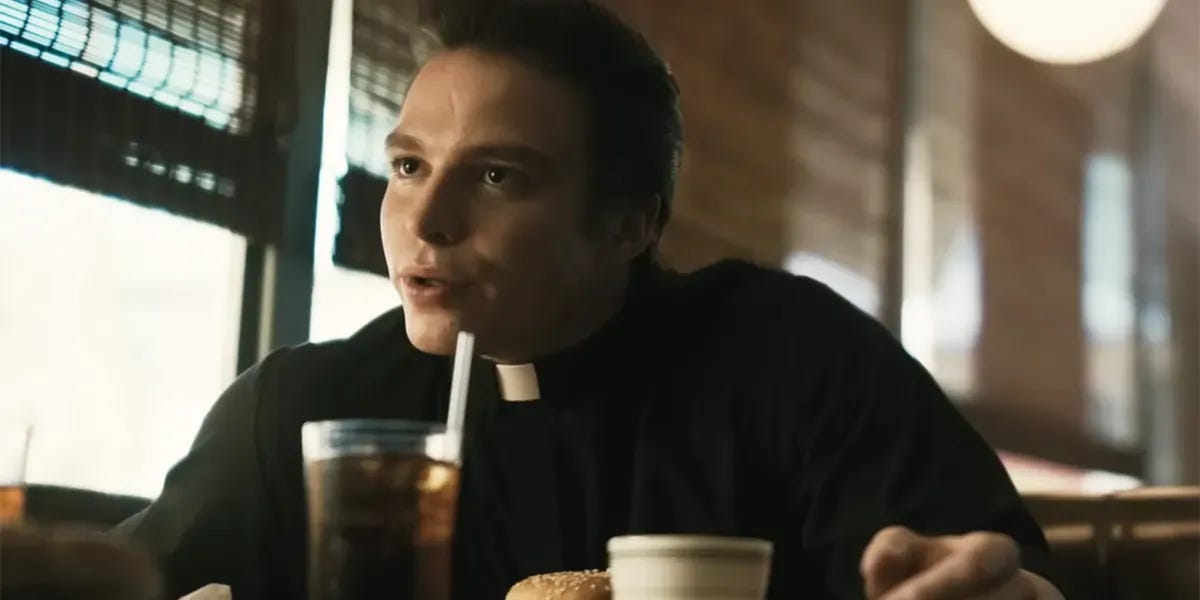
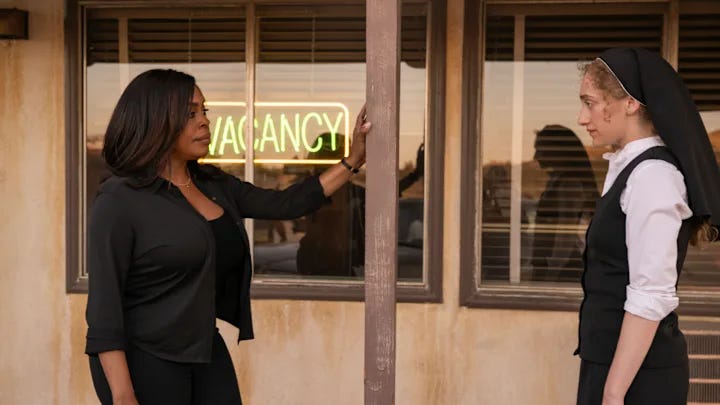
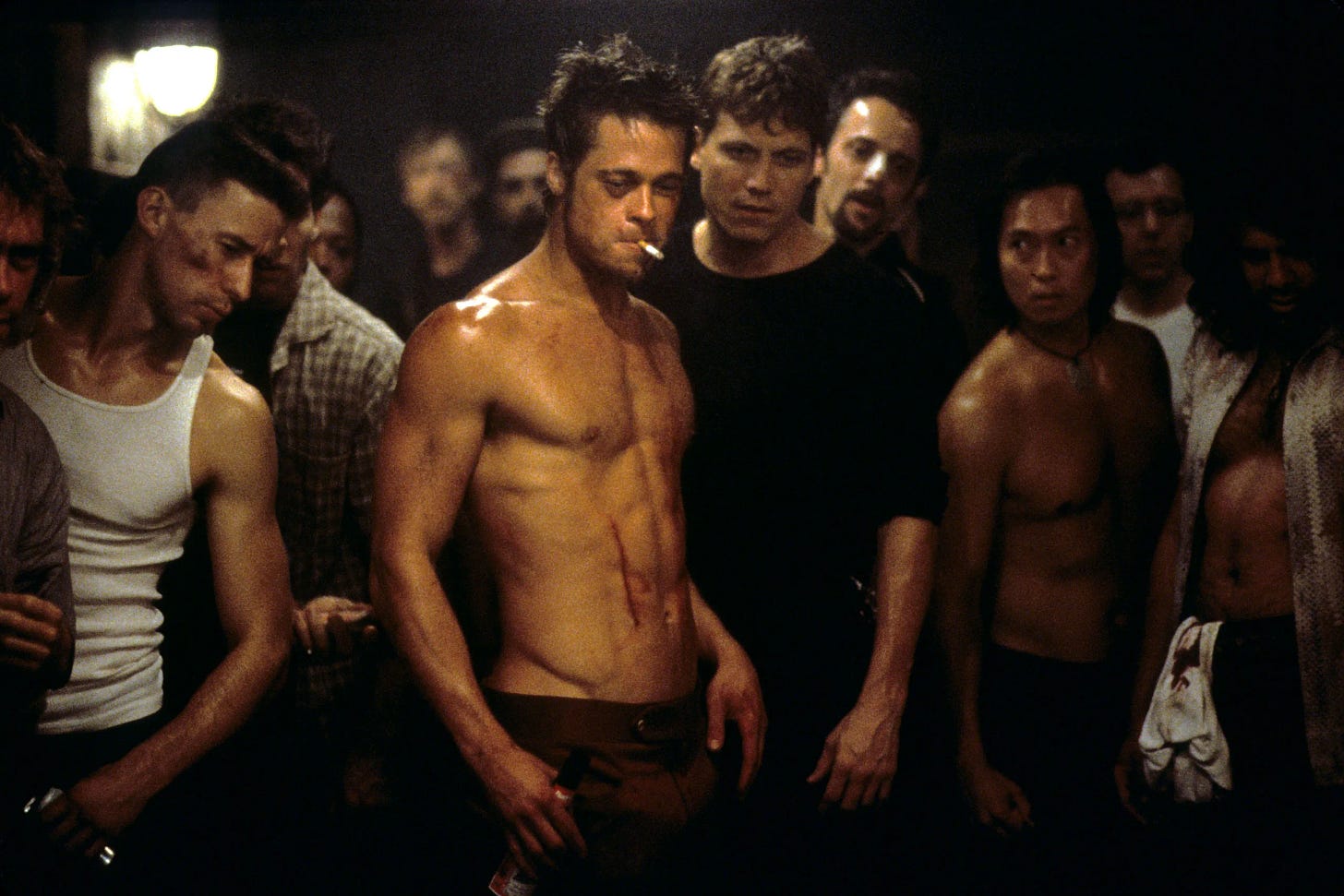
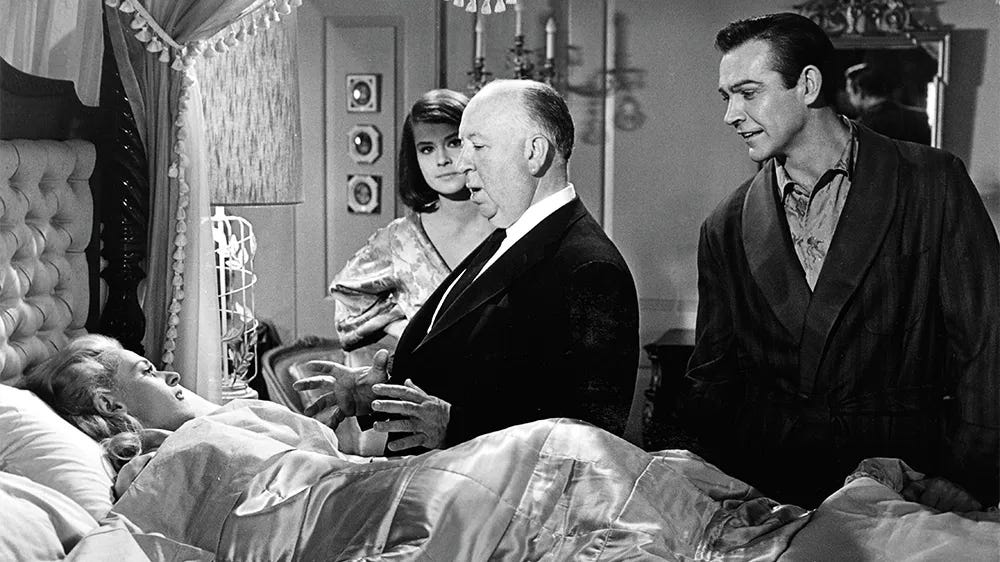

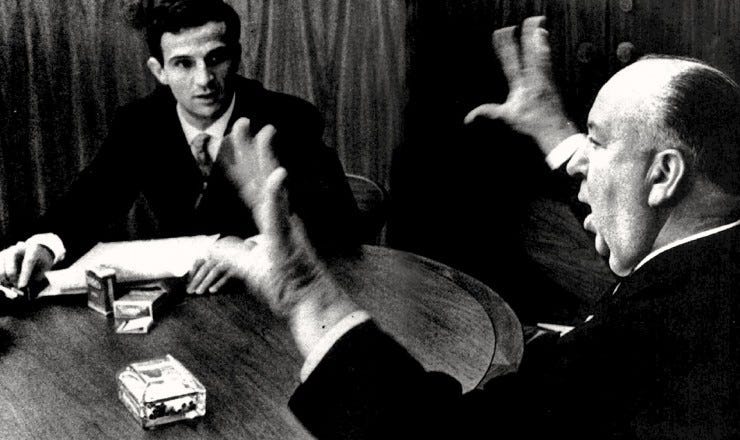
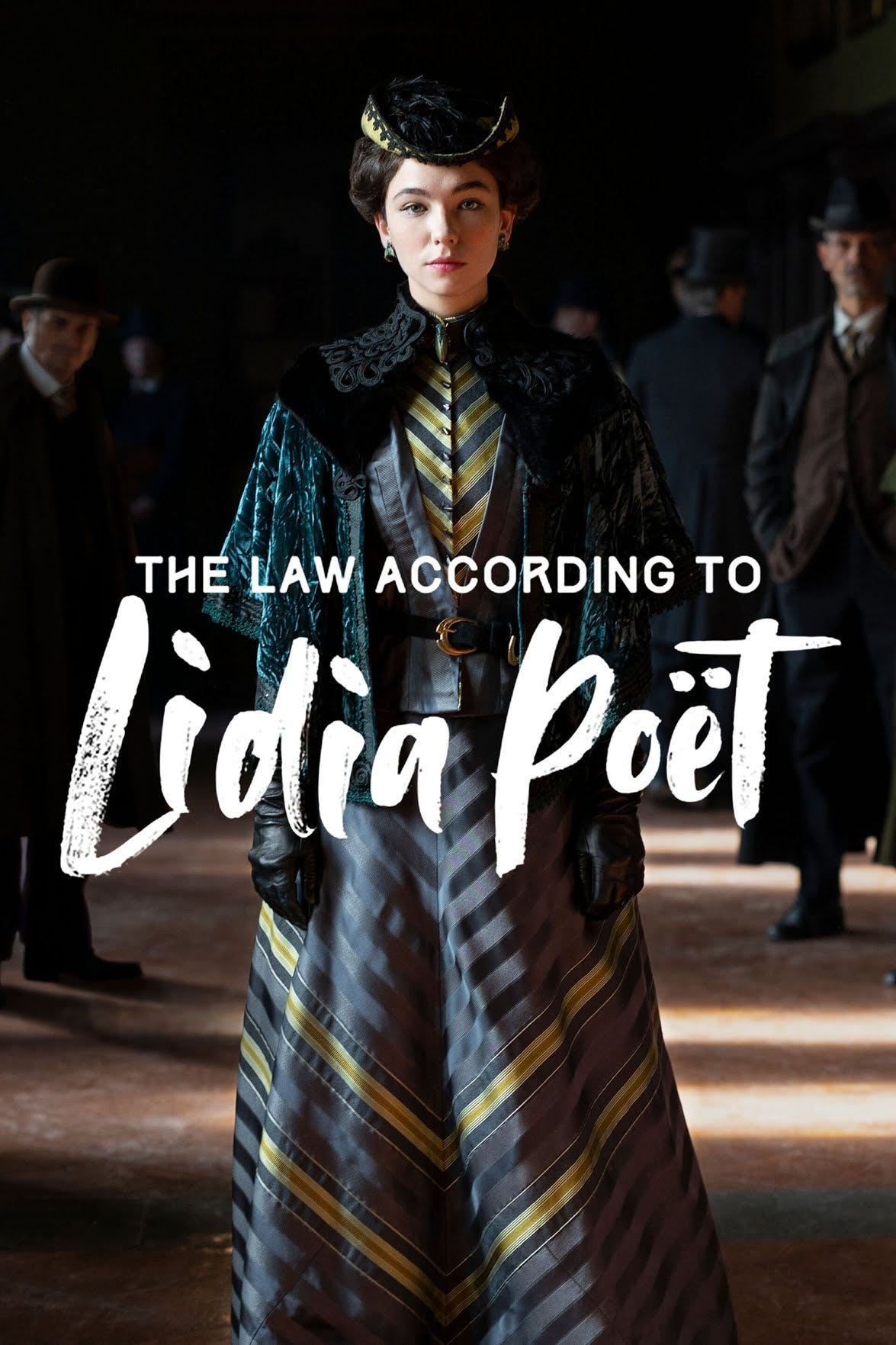


The interview sounds intriguing. Hitchcock was indeed a letch.
Excited for the new season of The Diplomat. Lidia Poet sounds interesting. Nice to see something worthwhile out of Italy.
I read the Hitchcock/Truffaut book. Super interesting. Hitchcock was a fascinating, complicated character.